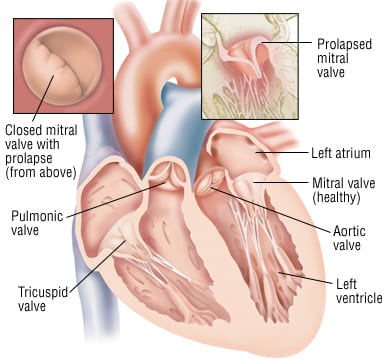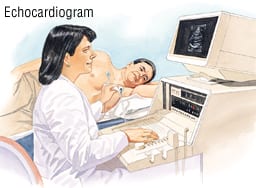Patient Basics: Mitral Valve Prolapse
Originally published by Harvard Health.
What Is It?
Mitral valve prolapse is a malfunction of the heart’s mitral valve, the physical doorway between the heart’s left atrium and left ventricle. Normally, the mitral valve closes when the ventricle’s muscles contract, preventing blood from flowing back into the left atrium when the heart pumps blood to the rest of the body. In mitral valve prolapse, however, a slight deformity of the mitral valve prevents the valve from closing normally. This appears as an abnormal floppiness, or prolapse, of the valve. The result is that small amounts of blood leak back into the left atrium, with very little effect on the heart’s overall ability to pump blood.
In some people, the leak worsens to create a significant backflow of blood into the left atrium. This is called mitral regurgitation. People with severe mitral regurgitation can develop symptoms such as shortness of breath, fatigue and leg swelling. Rarely, heart surgery is needed to repair the damaged valve.
In most people with mitral valve prolapse, the cause is unknown. However, in a small number of patients, mitral valve prolapse may be related to another medical condition, such as an inherited abnormality in the way the body produces collagen (connective tissue) or rheumatic heart disease (a rare complication of strep throat).
Health experts estimate that mitral valve prolapse currently affects up to 5% of people in the United States. For unknown reasons, the condition is most common in women between 14 and 30. The condition sometimes affects several members of the same family,and there is some evidence that the condition can be inherited.
Symptoms
Most people with mitral valve prolapse do not have any symptoms, and the condition is discovered only when a doctor hears a certain clicking sound with or without a heart murmur during a routine physical examination. In the past, mitral valve prolapse was blamed for symptoms such as chest pains, palpitations and lightheadedness. Although a person with mitral valve prolapse can also have these types of symptoms, mitral valve prolapse is not the cause.
People who have mitral regurgitation that continues to get worse can have symptoms of congestive heart failure (fatigue, shortness of breath, leg swelling).
Diagnosis
Your doctor will review your medical history, including any history of heart disease, excessive fatigue, leg swelling or shortness of breath.
You and your doctor may not suspect that you have mitral valve prolapse until your doctor hears a sound called a systolic click with the stethoscope during the cardiac portion of a routine physical examination. The systolic click is an abnormal heart sound related to the malfunction of the mitral valve in mitral valve prolapse. Some people also have a heart murmur, an abnormal heart sound caused by turbulent blood flow.
Your doctor can diagnose mitral valve prolapse if he or she hears the typical click. Your doctor may order an echocardiogram to determine the severity of the prolapse. This is a painless test that uses sound waves to map out your heart structure. However, an echocardiogram is not really needed for diagnosis, which can usually be made with a careful physical examination.
If you have symptoms such as chest pain, dizziness or palpitations, further tests may be needed to determine the cause.
Expected Duration
Mitral valve prolapse is a lifelong condition. However, most people with the condition do not have any symptoms.
Prevention
There is no way to prevent mitral valve prolapse.
Treatment
If you have mitral valve prolapse but do not have any symptoms, then you will not need treatment. In the past, your doctor may have recommended antibiotics prior to certain procedures and dental appointments, but recent guidelines from the American Heart Association indicate that antibiotics are no longer recommended for patients with mitral valve prolapse. Some people who have mitral valve prolapse with chest pains or palpitations take a beta-blocker medication, such as propranolol (Inderal), metoprolol (Lopressor) or atenolol (Tenormin), to treat symptoms.
If mitral valve prolapse develops into severe mitral regurgitation, the abnormal mitral valve may need to be repaired or replaced surgically.
When To Call a Professional
Call your doctor immediately if you have palpitations or an abnormal pulse, especially if these symptoms have also made you feel lightheaded or faint. Also call your doctor immediately if you have chest pain at any age.
Prognosis
Most people with mitral valve prolapse never have symptoms, and the condition never significantly affects lifestyle or life expectancy. When surgery is done to reconstruct or replace the mitral valve, it is successful in more than 90% of cases.
Additional Info
American Heart Association (AHA)
7272 Greenville Ave.
Dallas, TX 75231
Toll-Free: 1-800-242-8721
http://www.americanheart.org/
National Heart, Lung, and Blood Institute (NHLBI)
P.O. Box 30105
Bethesda, MD 20824-0105
Phone: 301-592-8573
TTY: 240-629-3255
Fax: 301-592-8563
http://www.nhlbi.nih.gov/




